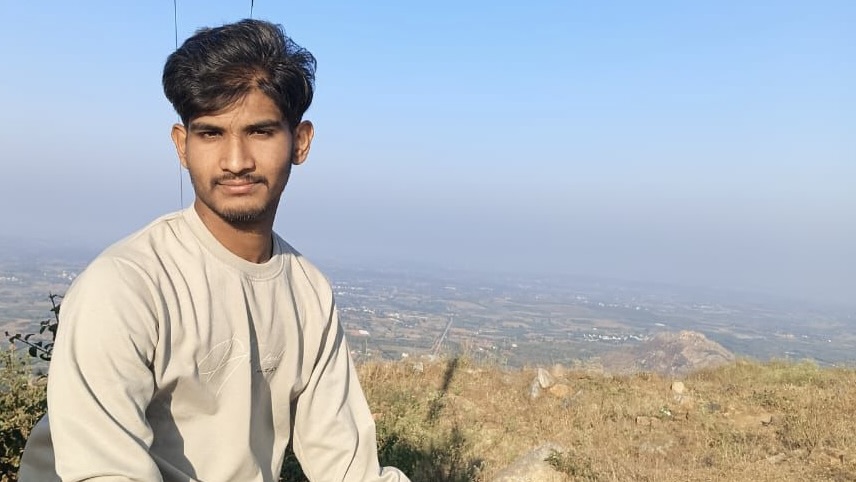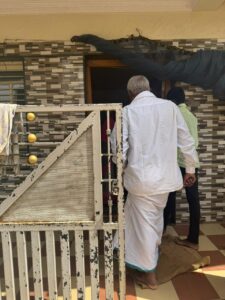Published Jun 09, 2025 | 9:00 AM ⚊ Updated Jun 11, 2025 | 9:11 AM

Shravan was one of the 11 young lives lost in the deadly stampede outside M Chinnaswamy Stadium in Bengaluru on 4 June.
Synopsis: A 20-year-old dental student, Shravan was among the 11 young lives snuffed out by the deadly stampede outside M Chinnaswamy Stadium in Bengaluru on 4 June. His untimely death brought a decades-long dream to a premature end – one nurtured by the farmers of his village, his grandparents, and his mother, who sacrificed comfort so her son could succeed.
A brass lamp flickers beside the garlanded photograph of the 20-year-old. The jasmine flowers surrounding his smiling face are fresh, but the room is thick with grief.
It was meant to be a long weekend. Shravan, a second-year dental student at a Bengaluru college, had called his grandfather on Tuesday night – something he did every day.
“I will be home on Friday,” he had promised. Bakrid was on Saturday, and he looked forward to the brief holiday.
The family had planned to cook his favourite ragi mudde. Instead, an ambulance arrived in their narrow lane early Thursday morning.
Shravan, who once dreamed of returning to his village in a white doctor’s coat, came back wrapped in a white sheet – in the back of the ambulance.
He was one of the 11 young lives lost in the deadly stampede outside M Chinnaswamy Stadium in Bengaluru on 4 June.
With his untimely death, a decades-long dream nurtured carefully by the farmers of his village, by his grandparents, and by his mother – who gave up comfort so her son could rise – also came to a tragic, early end.
When South First visited Shravan’s joint-family home in Koorathalli village, Chikkaballapur district – about two hours north-west of Bengaluru – it felt as if time had paused.
The television sat unplugged. No cousins running about, no sounds from the kitchen. Just silence. Not the gentle kind, but a dense, paralysing stillness –that which descends with the heaviness of sorrow.
The women of the house were missing – not in presence, but in spirit. Shravan’s 35-year-old mother had fainted that morning and had still not fully regained consciousness.

Fifteen people live in the house. Everyone contributes. But it was Shravan and his elder brother Sridhar who had emerged as the family’s rising sons.
“I have never seen her attend any function or outing. She was always immersed in work,” said Radhakrishna, a progressive farmer, neighbour and close relative of Shravan.
“I’ve seen this family since my childhood. They’ve always worked hard. It’s a joint family – a model for the entire village. No quarrels, no complaints. The parents are farmers with a small patch of land and a small brick kiln.”
He continued: “Shravan was raised with strong moral values, all instilled by his grandfather, a farmer himself. The man is generous, looked after everyone in the village. Never said ‘no’ to anyone who needed help. That’s the kind of family this is – honest, humble, full of dignity.”
Fifteen people live in the house. Everyone contributes. But it was Shravan and his elder brother Sridhar who had emerged as the family’s rising sons – first-generation learners expected to break the cycle of hardship.
“He used to wash cattle, look after the fields, and study without complaint,” Radhakrishna recalled.
“He had just one close friend from the village. No bad habits. That’s the kind of upbringing his grandparents gave him.”
Shravan’s grandfather, Ramappa, held himself with dignity, even as sorrow softened his words into a whisper.
“It was me who brought both the boys up,” he said, eyes fixed on the floor.
“My eldest grandson…I tried to make him a doctor, but he joined GKVK [Gandhi Krishi Vigyana Kendra, Bengaluru] and is doing well in agricultural studies. Shravan, my favourite… very intelligent, but scored a little less in NEET. He chose to take a long-term coaching course in Karkala. He got a dental seat and was studying in second year in Bengaluru.”
Ramappa called Shravan every day at 2.30 just to hear his voice.
“Even that day, I called like usual. It was already 2.30. Usually, five or ten minutes before that, I would call – his classes start around then. But he didn’t pick up. I thought maybe he was already in class,” he recalled.
The family had no idea he had gone to see the RCB team at the facilitation ceremony.
“If I had called five minutes earlier that day… maybe he would have told me his plans… maybe I could have stopped him…” he murmured, his voice trailing off.
“No one in the family follows cricket seriously,” said his father, Thimappa.
“Shravan would watch if someone else did, but it wasn’t really his game. He might play cricket with his brother and a friend – but was not a cricket buff.”
“He told us he was coming Friday. He had returned to college just fifteen days ago – on 15 May.”
Then came a call from the college principal: “Your son has fallen unconscious and is in the hospital. Come to Bengaluru soon.”
“They said he fainted,” Thimappa recalled. He called his other son, Sridhar, and asked him to rush to the hospital.
Shravan’s uncle, KN Manjunath, had been watching television when he saw crowds swell outside the Chinnaswamy Stadium.
“I felt unsettled that that day, for some reason,” he said.
“As I watched the screen, with no clue that Shravan had gone there, I felt a strange heaviness. I walked to my uncle’s house and was told about the principal’s call. I rushed to Bengaluru with them.”
“We didn’t know the truth until we reached Bowring Hospital. Police told us the body was in the mortuary. I froze. My father fainted right there,” added Sridhar.
He was inconsolable. Tears streamed continuously. The trio chose not to inform the grandparents and relatives immediately.
They waited – desperately hoping Shravan would call back and say it was just dehydration, that he had fainted and recovered.
Sridhar remembered the last time he and Shravan played cricket together.
“It was always just the three of us – me, Shravan, and another friend. We never needed anyone else,” he said.
Shravan had once wanted to join the Army after his Second PUC, but the family dissuaded him.
“Obviously,” Sridhar said, his voice cracking, “he wanted to make our grandfather proud. He wanted to serve the country. But when the elders didn’t approve of his plan to be a soldier, he said he would become a doctor instead – serve the state, serve his village.”
“He was everything we wanted to be,” Shravan’s close friend Vinuth said.
“He taught me everything. During Covid, when schools were shut, his house was my school. He made me study – Kannada, Hindi, English poems – he even framed questions. I hated studying, but he made me believe in myself.”
Shravan had encouraged him to write CET.
“I didn’t get a seat. I had quit college for two years after my diploma in sericulture. But he never gave up on me,” Vinuth recalled.
“He kept saying, ‘If it’s written in our fate and we work hard, we will succeed.’ This year, I got into BSc Sericulture. All because of him.”
As news of Shravan’s death spread, some began blaming the RCB players.
But, even in his grief, Sridhar is clear where he places the blame:
“We are not blaming players or the RCB team. The fault is with poor planning. Improper arrangements. No crowd control. No police. This was a government failure.”
He paused, took a deep breath, and added, “My friends from GKVK stood by me through it all – from the hospital to the mortuary, to getting permissions. They stayed with me all night. I will never forget that.”
When asked how it felt without Shravan, his uncle, still teary-eyed, responded softly, his voice cracking: “Without him… it is like a temple without the God.”
(Edited by Dese Gowda)

